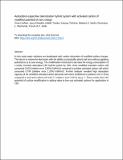| dc.contributor.author | Sufiani, Omari | |
| dc.contributor.author | Elisadiki, Joyce | |
| dc.contributor.author | Tanaka, Hideki | |
| dc.contributor.author | Teshima, Katsuya | |
| dc.contributor.author | Sahini, Mtabazi | |
| dc.contributor.author | Machunda, Revocatus | |
| dc.contributor.author | Jande, Yusufu | |
| dc.date.accessioned | 2023-03-01T08:57:40Z | |
| dc.date.available | 2023-03-01T08:57:40Z | |
| dc.date.issued | 2023-02-15 | |
| dc.identifier.uri | https://doi.org/10.1016/j.envres.2022.115114 | |
| dc.identifier.uri | https://dspace.nm-aist.ac.tz/handle/20.500.12479/1813 | |
| dc.description | This research article was published by Elsevier, 2023 | en_US |
| dc.description.abstract | In this study water solutions are desalinated with carbon electrodes of modified surface charges. The idea is to endow the electrodes with the ability to physically adsorb salt ions without applying potential so as to save energy. The modification enhanced to decrease the energy consumption of a newly invented adsorption-CDI hybrid system by 19%, since modified activated carbon cell consumed 0.620 (relative error 3.00%) kWh/m3 compared to pristine activated carbon cell which consumed 0.746 (relative error 1.20%) kWh/m3. Further analysis revealed high adsorption capacity of the modified activated carbon electrode cell which exhibited 9.0 (relative error 2.22%) compared to activated carbon cell with 5.3 (relative error 5.66%) mg g−1. These results show the potential of surface modification in adding value to low cost activated carbons for application in CDI. | en_US |
| dc.language.iso | en | en_US |
| dc.publisher | Elsevier | en_US |
| dc.subject | Research Subject Categories::NATURAL SCIENCES | en_US |
| dc.title | Adsorption-capacitive deionization hybrid system with activated carbon of modified potential of zero charge | en_US |
| dc.type | Article | en_US |

